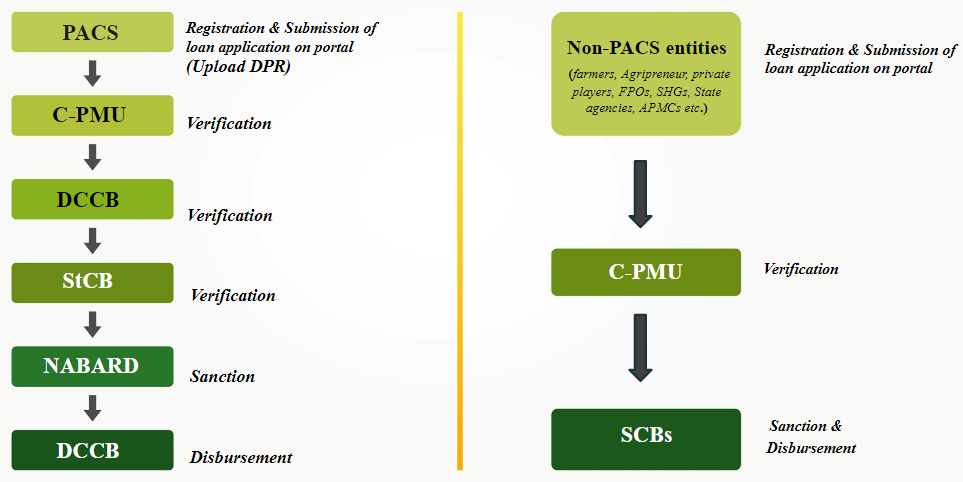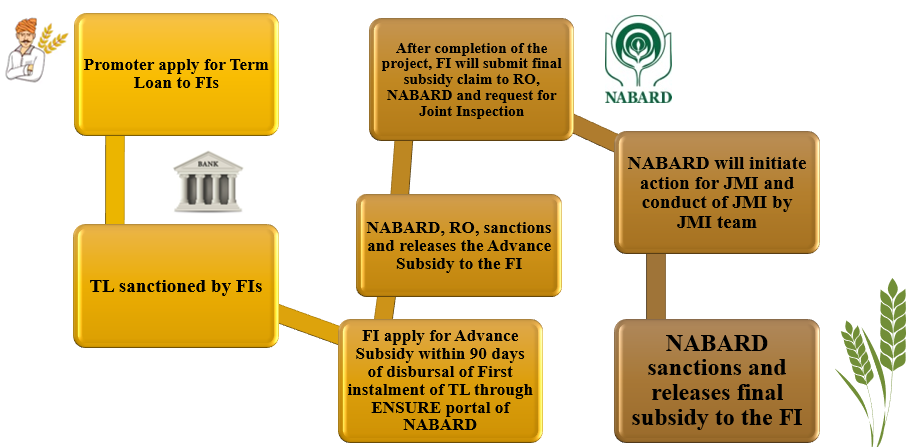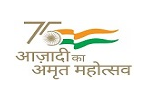In addition to the initiatives taken by the Ministry of Cooperation there are several Government schemes which have been converged pertaining to Agriculture Sector, Fishery Sector, Dairy Sector and Other Ministries' Beneficiary Schemes. Few of the major schemes are mentioned below:
The Agriculture Infrastructure Fund (AIF) was launched as part of the Atmanirbhar Bharat Abhiyan (Self-Reliant India Campaign) announced by the Indian government in May 2020. The fund is managed and disbursed by the National Bank for Agriculture and Rural Development (NABARD) in collaboration with other financial institutions. AIF is a financial support scheme initiated by the government of India to boost agricultural infrastructure in the country. The primary objective of the fund is to strengthen the agricultural sector by providing financial assistance for the development and upgradation of post-harvest infrastructure and community farming assets.
- High post harvest loses
- Huge infrastructure Gap
- Dependence on intermediaries
- Lack of long-term institutional funding
- Slow technology adoption in Agriculture
The Agriculture Infrastructure Fund (AIF) offers several benefits to the agricultural sector, farmers, and the overall economy. Some of the key advantages of the AIF are:
- Interest Subvention: Cap of ROI ≤ 9% & subvention of 3% p.a. (NABARD loans for PACS at 1% post subvention)
- Credit Guarantee: Under CGTMSE scheme for loan up to Rs. 2 Crore (FPO Promotion Fund Support for FPOs)
- Convergence: Allowed to dovetail with several schemes (across ministries, state govt.)
- Project Eligibility: Up to 25 projects at different locations; Rs.2 Cr. per Project
Overall, the Agriculture Infrastructure Fund plays a significant role in strengthening the agricultural sector, benefiting farmers, agri-entrepreneurs, and the entire economy. It supports the development of a robust and efficient agricultural supply chain, reducing losses, and promoting sustainable agricultural practices.
Steps required for submission of proposal for availing the scheme under AIF.

The Agricultural Marketing Infrastructure (AMI) sub-scheme of ISAM is being implemented by the Ministry of Agriculture and Farmers’ Welfare, Government of India. The AMI sub-scheme of ISAM is applicable for new credit linked projects, where term loan has been sanctioned by eligible financial institutions from 22.10.2018 onwards. NABARD is the channelising agency for release of subsidy @ 25% to 33.33% of the capital cost for institutions eligible for refinance by NABARD or any other FI such as State Financial Corporations (SFCs) approved by DAC & FW.
- Cold Storage up to 1000 MT
- Mini Dal Mill/Oil Mill
- Common Facilitation Centre for FPOs
- Storage Infrastructure
- Non-Storage Infrastructure (Primary Processing)
- Development/Upgradation of Rural Haats into GrAMs
- Mobile Infrastructure
- Infrastructure for Market Yard
Steps required for submission of proposal for availing the scheme under AMI.

The Sub-Mission on Agricultural Mechanization (SMAM) is a scheme initiated by the Government of India to promote the adoption of modern and efficient agricultural machinery and equipment among farmers. It is part of the larger scheme called the "National Mission on Agricultural Extension and Technology" (NMAET) under the Ministry of Agriculture and Farmers' Welfare.
SMAM provides financial assistance and support to farmers, farmer groups, cooperatives, and agricultural entrepreneurs for the purchase and establishment of agricultural machinery and equipment. The scheme aims to create a farm machinery ecosystem that addresses the varied needs of farmers across different regions and cropping patterns, ensuring inclusive and sustainable agricultural mechanization in India.
- For Training/ Demonstration - 80% grant-in-aid for purchase of machinery and equipments including post-harvest technology machines for conducting demonstrations on the farmers’ fields
- Individual beneficiaries 40% of machine cost, 50% of machine cost for SC, ST, Small & Marginal farmers & NE beneficiaries (Under DBT)
- CCustom hiring Centres - 40% of the machine cost
Steps required for submission of proposal for availing the scheme under SMAM.

The Mission for Integrated Development of Horticulture (MIDH) is a centrally sponsored scheme implemented by the Government of India to promote holistic and sustainable growth of the horticulture sector in the country. Launched in 2014-15, MIDH is a merger of several horticulture-related schemes, and it encompasses various components aimed at boosting horticultural production, productivity, and market linkages.
Centrally Sponsored Schemes
- National Horticulture Mission (NHM): Ratio of Central Share (60%:40%) in all States Except NE and Himalayan States. In all UTs except J&K, the Central share is 100%. In J&K, it is 90%:10%.
- Horticulture Mission for North East & Himalayan States (HMNEH): Ratio of Central Share in NE and Himalayan States (except Ladakh where it is 100%). In all UTs except J&K, the Central share is 100%. In J&K, it is 90%:10%.
Central Sector Schemes
- National Horticulture Board (NHB): Development of Commercial Horticulture- Ratio of Central Share (100%) in all States
- Coconut Development Board (CDB): Development Schemes for Coconut- Ratio of Central Share (100%) in all Coconut growing States
- Central Institute of Horticulture (CIH)- Ratio of Central Share (100%) in all States
Steps required for submission of proposal for availing the scheme under MIDH.
The Pradhan Mantri Formalization of Micro Food Processing Enterprises (PMFME) is a flagship scheme launched by the Government of India to promote the formalization and growth of micro food processing units in the country. The scheme was launched as part of the "Atmanirbhar Bharat Abhiyan" (Self-Reliant India Campaign) and aims to support the food processing sector, especially the small and micro enterprises.
Support to Individual Micro Enterprises:
- Credit-linked capital subsidy @35% of the eligible project cost
- Maximum ceiling - Rs.10.0 lakh per unit.
- Beneficiary contribution s-10% of the project cost with balance being loan from Bank.
Support to FPOs/Producer Cooperatives:
- Grant @35% with credit linkage
- Training support
Support to SHGs:
- Seed capital @ Rs40,000/- per member of SHG - working capital
- Individual SHG member - credit linked grant @35% cap of Rs 10 lakh.
- Training & Handholding Support to SHG
Support for Common Infrastructure (hiring basis):
- Eligible Beneficiaries : FPOs, SHGs, cooperatives, any Government agency or private enterprises.
- Subsidy : Credit linked grant @ 35%
Steps required for submission of proposal for availing the scheme under PMFME.

Pradhan Mantri Matsya Sampada Yojana (PMMSY) is a flagship scheme launched by the Government of India to promote the sustainable and inclusive development of the fisheries sector in the country. The scheme was announced in May 2020 as part of the "Atmanirbhar Bharat Abhiyan" (Self-Reliant India Campaign) and seeks to boost fish production, enhance infrastructure, modernize the fishing industry, and create employment opportunities in the fisheries and aquaculture sector.
Central Sector Scheme (CS)
- The entire project/unit cost will be borne by the Central government (i.e. 100% central funding).
- Direct beneficiary oriented i.e. individual/group activities are undertaken by the entities of central government including National Fisheries Development Board (NFDB) - central assistance will be up to 40% of the unit/project cost for General category
- 60% for SC/ST/Women category
Centrally Sponsored Scheme (CSS)
- The Government financial assistance of both Centre and State/UTs governments together will be limited
- 40% of the project/unit cost for General category
- 60% of the project/unit cost for SC/ST/Women.
Steps required for submission of proposal for availing the scheme under PMMSY.

Fisheries and Aquaculture Infrastructure Development Fund (FIDF) is a financing scheme initiated by the Government of India to promote the development of fisheries and aquaculture infrastructure in the country. The scheme was launched under the Department of Animal Husbandry, Dairying, and Fisheries (DADF) to support the growth of the fisheries and aquaculture sector and improve the socio-economic conditions of fisherfolk.
Fisheries and Aquaculture Infrastructure Development Fund (FIDF) plays a crucial role in the development and growth of the fisheries and aquaculture sector in India. The fund's comprehensive support fosters sustainable and inclusive development, benefiting fisherfolk, consumers, and the economy as a whole.
- Interest subvention : Up to 3% per annum
- Lending Rate of interest : Not lower than 5% per annum
- Repayment period : 12 years inclusive of moratorium of 2 years
- Eligible Loan : Max 80 % of project cost
- Beneficiary Contribution : 20 % of project cost as margin money
Steps required for submission of proposal for availing the scheme under FIDF.

- To create and strengthen infrastructure for quality milk
- Including cold chain infrastructure linking the farmer to the consumer
- To provide training to dairy farmers for clean milk production
- To create awareness on Quality & Clean Milk Production
- To support research and development on Quality milk and milk products
| No. | Particulars | Funding Patterns | ||
|---|---|---|---|---|
| Loan | Grant | PI’s/State’s Contribution | ||
| A | Assistance to Village level Producers’ Institution | |||
| A1 | Building for Village Producer Institution | 50% | 50% | - |
| A2 | SS Milk Collection Accessories, testing equipment, DCS Boards, Furniture etc. | - | 90% | 10% |
| A3 | AMCU / DPMCU | 50% | 50% | - |
| A4 | Management Grants to Village level functionary (tapering over 2 years - 100%, 50%) | - | 90% | 10% |
| B | Support for BMCs | |||
| B1 | Building for Bulk Cooler | 50% | 50% | - |
| B2 | Bulk Milk Coolers | 50% | 50% | - |
| B3 | Tankers for milk transportation | 50% | 50% | - |
Steps required for submission of proposal for availing the scheme under NPDD.

- https://ncdc.in/index.jsp?page=project-profile=en
- https://ncdc.in/index.jsp?page=project-report=en
- https://www.nabard.org/info-centre-model-bankable-projects.aspx?cid=506&id=24
- https://www.mudra.org.in/Default/DownloadFile/Project_profiles.pdf
- https://my.msme.gov.in/MyMsmeMob/MsmeProjectProfile/Home.htm
Dairy Processing and Infrastructure Development Fund (DIDF) is a financial scheme initiated by the Government of India to support the modernization and expansion of the dairy processing sector in the country. The scheme was launched under the Department of Animal Husbandry, Dairying, and Fisheries (DADF) with the aim of enhancing milk processing capacity, improving milk quality, and promoting value addition in the dairy sector.
Dairy Processing and Infrastructure Development Fund (DIDF) plays a crucial role in fostering the growth and modernization of the dairy processing sector in India. It supports dairy farmers and milk processing units in their efforts to meet the rising demand for dairy products, enhance milk quality, and contribute to the overall development of the dairy industry in the country.
- Interest subvention of 2.5% on loan
- EEBs contribution - 20% (minimum)
- Tenure of loan - 10 Years, including moratorium period of a maximum 2 years
Steps required for submission of proposal for availing the scheme under DIDF.

- https://ncdc.in/index.jsp?page=project-profile=en
- https://ncdc.in/index.jsp?page=project-report=en
- https://www.nabard.org/info-centre-model-bankable-projects.aspx?cid=506&id=24
- https://www.mudra.org.in/Default/DownloadFile/Project_profiles.pdf
- https://my.msme.gov.in/MyMsmeMob/MsmeProjectProfile/Home.htm
The Pradhan Mantri Kisan SAMPADA Yojana (PMKSY) is a comprehensive flagship scheme launched by the Government of India to modernize and strengthen the agro-processing industry in the country. SAMPADA stands for "Scheme for Agro-Marine Processing and Development of Agro-Processing Clusters." The primary objective of PMKSY is to reduce food wastage and enhance the value addition to agricultural and horticultural produce, benefiting farmers and consumers alike.
Integrated Cold Chain and Value Addition Infrastructure
-
For storage infrastructure - Pack House and Pre cooling unit, ripening chamber & transport infrastructure
- Grant-in-aid @ 35% for General Areas
- @ 50% for North East States, Himalayan States, ITDP Areas & Islands
-
For value addition and processing infrastructure - frozen storage/ deep freezers associated and integral to the processing
- Grant-in-aid @ 50% for General Areas
- @ 75% for North East States, Himalayan States, ITDP Areas & Islands, will be provided.
- For irradiation facilities - grant-in-aid will be provided @ 50% for General Areas and @ 75% for North East States, Himalayan States, ITDP Areas & Islands
Integrated Cold Chain and Value Addition Infrastructure
- Grants-in-aid @35% of eligible project cost in general areas
- @50% of eligible project cost in the North East States including Sikkim and difficult areas namely Himalayan States (i.e. Himachal Pradesh, Jammu & Kashmir and Uttarakhand), State notified ITDP areas & Islands
Operation Greens
- 50% grant in aid for all eligible projects upto max of 50 crore projects.
- 50% subsidy for construction and hiring of storage facilities.
Steps required for submission of proposal for availing the scheme under PMKSY.
- https://my.msme.gov.in/MyMsmeMob/MsmeProjectProfile/Home.htm
- https://ncdc.in/index.jsp?page=project-profile=en
- https://ncdc.in/index.jsp?page=project-report=en
- https://www.nabard.org/info-centre-model-bankable-projects.aspx?cid=506&id=24
- https://www.mudra.org.in/Default/DownloadFile/Project_profiles.pdf











